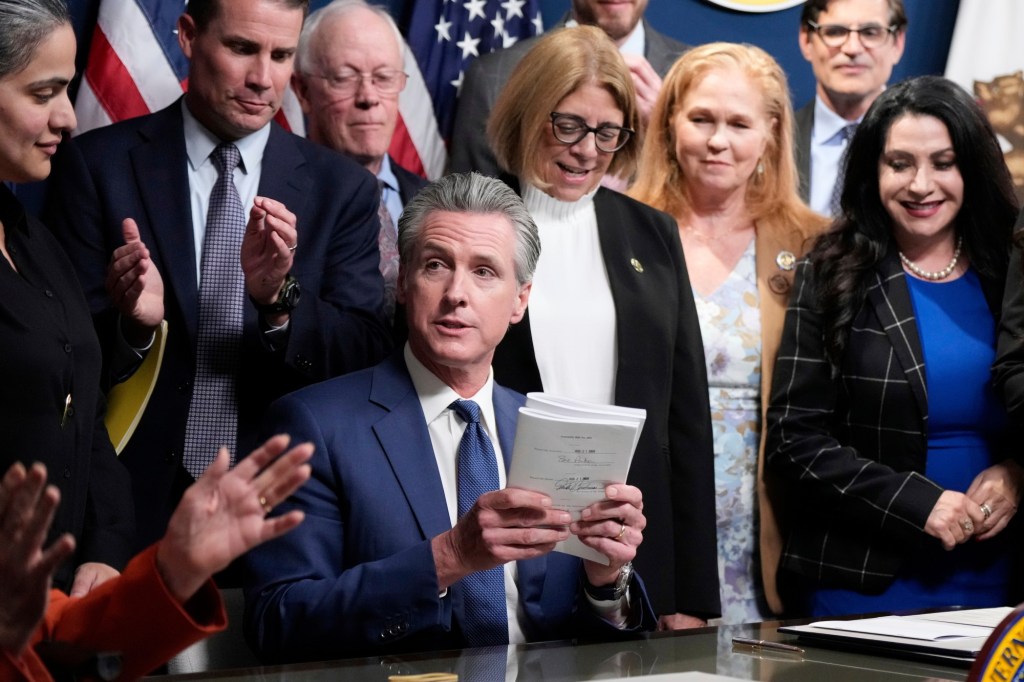
By now, most voters know that Gov. Gavin Newsom and the state Legislature have scheduled a special election for November 4 to consider Proposition 50 – a proposed constitutional amendment that would deprive voters of fairly drawn congressional districts.
But a few crucial points have not been publicized. First, this special election shrinks by nearly 60% the standard 131-day period for evaluating a proposed constitutional amendment. Second, this compressed pre-election period has deprived Californians of the standard time for submitting ballot arguments or for challenging the fairness of the ballot title and summary upon which many voters rely in deciding how to vote. Third, the text of the constitutional amendment itself conceals both its content and its impact because it cryptically adopts the congressional districts “reflected in Assembly Bill 604” (which means nothing to the average voter) and then opaquely exempts those new districts from complying with any of the fair redistricting standards that the voters had enacted into the California Constitution in 2008 and 2010.
Accordingly, only an overwhelming “no” vote to this inequitable election will assure that no California governor or Legislature attempts this type of deception again. Otherwise, you can count on it happening again when it suits the politicians.
First, the Legislature has unduly collapsed the standard 131 days specified in the California Constitution to 75 days for voters to consider this proposed constitutional amendment, which would undermine their right to fair elections. Since 1938, the California Constitution has required that elections for constitutional amendments proposed by the People be held at least 131 days after they qualify.
While the Constitution is silent regarding the rules that govern constitutional amendments proposed by the Legislature, there is no good reason why the Legislature should not adhere to the same rules that apply to the People. Indeed, the Legislature has codified the 131-day requirement in our Elections Code, but has exempted itself from this requirement for this election. Shrinking the time to consider a constitutional amendment from 131 to 75 days is unprecedented in the modern era.
Second, by scheduling the election a mere 75 days later, the Legislature has had to unduly compress the pre-election schedule in a way that prejudices the voters.
For instance, the secretary of state had to allow only two business days after passage of the proposed constitutional amendment for interested voters to submit ballot arguments for the Voter Information Guide and only one business day to draft rebuttals to the arguments selected for the ballot.
Likewise, the Legislature shortened the time to review and challenge the all-important ballot title and summary from the usual 20 days to eight days (three of which were over the Labor Day weekend). This effectively precluded any legal challenge to the fairness and accuracy of the ballot title and summary.
As a result, the title and summary are misleading. The California Supreme Court has ruled that the ballot title and summary “must reasonably inform the voter of the character and real purpose of the proposed measure.” But here, the title and summary fail to acknowledge that the new congressional districts are an intentional gerrymander or that a political consultant drew these new districts without any public input or changes during the legislative process.
Moreover, instead of informing voters of the measure’s true purpose, two of the three paragraphs in the ballot title and summary deceptively reference “[r]etain[ing] California’s independent Citizens Redistricting Commission” and “supporting … fair, independent, and nonpartisan redistricting commissions,” which the proposed amendment rejects for the next six years.
Also left unsaid is that the proposed constitutional amendment abandons the fair and neutral redistricting criteria for drawing congressional districts established in the California Constitution for the next six years, such as maintaining the geographic integrity of cities, counties, neighborhoods and communities of interest to the extent possible. Instead, the proposed constitutional amendment merely references the “districts for Congress reflected in Assembly Bill 604” “notwithstanding any other provision of this Constitution,” thereby excluding the Constitution’s existing fair redistricting standards.
To further deceive voters, the Legislature has commanded the Legislative Analyst to provide a hyperlink to “visual depictions” of the shape of the proposed districts, which, of course, fail to show whether the districts maintain the geographic integrity of cities, counties, local neighborhoods and communities of interest, as required under our current Constitution. In fact, one report already indicates that in the Sacramento region, the redistricting splits Asian and Black communities of interest. In short, voters will not understand how their districts have been changed. And the accelerated election schedule ensures that they won’t.
Voters need to send a message to the governor and Legislature by voting a resounding “no” to their prioritizing political power over policy. If this expedited election is successful in undoing fair districts, politicians will repeat this formula to maintain their power in the future. And when that happens, the politicians win and you lose – again.
Daniel M. Kolkey, an attorney and former California appellate judge, served as counsel to Gov. Pete Wilson, and was the primary draftsman of Proposition 20 that provided for the Citizens Redistricting Commission to draw California’s congressional districts.



